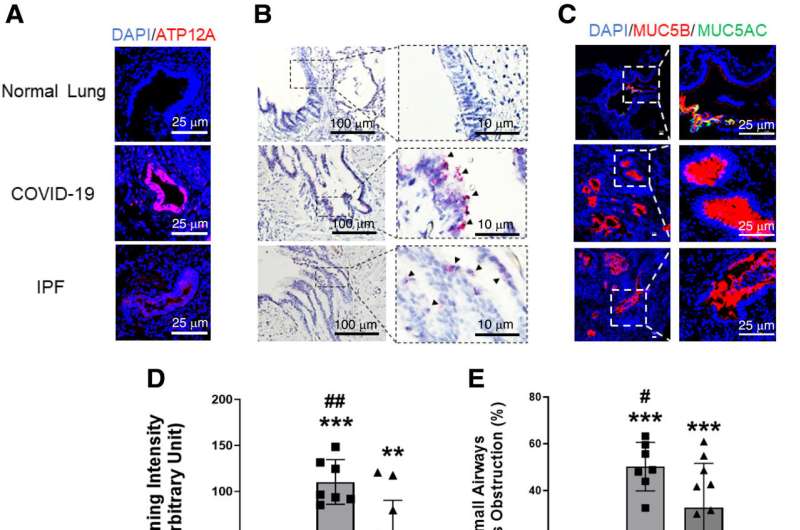This article has been reviewed according to Science X's editorial process and policies. Editors have highlighted the following attributes while ensuring the content's credibility:
fact-checked
peer-reviewed publication
trusted source
proofread
Almost 10% of US lung transplants go to COVID-19 patients. Researchers are learning why

Researchers from Michigan State University and Corewell Health, in collaboration with the Cleveland Clinic, have made a significant breakthrough in understanding post-COVID-19 lung complications.
The study, by Xiaopeng Li of MSU, Reda Girgis of Corewell Health and Kun Li of Cleveland Clinic's Florida Research and Innovation Center, was published in the American Journal of Respiratory Cell and Molecular Biology and highlights the role of a gene called ATP12A in promoting lung damage and excessive mucus production following COVID-19 infection.
COVID-19 infection activates this gene in the lungs, initiating progressive lung scarring that can eventually require a lung transplant. The collaboration investigated the biology behind climbing lung transplant rates among patients with post-COVID pulmonary fibrosis. Almost 10% of all lung transplants in the United States now go to COVID-19 patients, according to data from the United Network for Organ Sharing, or UNOS.
"Understanding how and why some individuals develop severe lifelong complications is critical to developing more effective post-COVID lung damage treatment," said Xiaopeng Li, associate professor in the MSU College of Human Medicine's Department of Pediatrics and Human Development.
Collaborating with Kun Li, Xiaopeng Li investigated ATP12A expression in lung samples from individuals undergoing lung transplantation. Clinical samples provided by Reda Girgis, medical director of Corewell Health's lung transplant program and a professor at MSU, confirmed elevated ATP12A levels in individuals with post-COVID-19 pulmonary fibrosis, akin to fibrosis unrelated to COVID-19.
"At Cleveland Clinic, we confirmed COVID-19 infection directly caused ATP12A levels to increase and contributed to pulmonary fibrosis," noted Kun Li.
This discovery lays the groundwork for potential therapeutic interventions, aiming to benefit all pulmonary fibrosis patients, irrespective of their condition's origin. The next step for the researchers is to unravel how infection elevates ATP12A levels and its contribution to pulmonary fibrosis, paving the way for improved treatments in the future.
More information: Mohamed Abdelgied et al, Increased Expression of ATP12A in Small Airway Epithelia of Post–COVID-19 Pulmonary Fibrosis, American Journal of Respiratory Cell and Molecular Biology (2024). DOI: 10.1165/rcmb.2023-0419LE



















